- Home
- Lynne Olson
Those Angry Days Page 9
Those Angry Days Read online
Page 9
WITHIN DAYS OF BRITAIN’S and France’s declarations of war against Germany, isolationist members of Congress and their allies launched a drive to arouse public opposition to administration attempts to aid the Western allies. Hundreds of thousands of antiwar letters, postcards, petitions, and telegrams poured into the offices of senators and congressmen. Some members received so much mail that hand trucks were needed to deliver it.
While many in both houses of Congress were ardently opposed to U.S. intervention in the war, the real stronghold of isolationism was the Senate, where a handful of members held the whip hand in foreign affairs. They included Burton Wheeler and several other prominent progressive senators from the Midwest and West, chief among them William Borah, Hiram Johnson of California, and Gerald Nye of North Dakota.
Ironically, although all but Wheeler were Republicans, they had strongly backed most of FDR’s early domestic legislation, breaking with the administration only when they thought it was not bold or radical enough. Colorful, quirky, and rebellious, the GOP progressives, in their fight for social and economic justice and against the concentration of economic power, had repeatedly defied the three Republican administrations preceding Roosevelt’s. Exasperated by their refusal to fit the conservative Republican mold, one GOP leader called them “sons of the wild jackass”—a term the progressives proudly adopted as their “password and badge of honor.”
Of this group, Wheeler was the only newcomer to the isolationist cause. Although he had always been antiwar, he had touted the importance of collective security after World War I and had supported the League of Nations. His opposition to Roosevelt’s campaign to help Britain and France stemmed less from hard-core isolationist beliefs than from his intense dislike of the president and his determination to prevent FDR from garnering any more power. He shared the view expressed by Hiram Johnson that Roosevelt “wants to knock down two dictators in Europe, so that one may be firmly implanted in America.”
Borah and Johnson, the two ranking Republicans on the Senate Foreign Relations Committee, were the grand old men of American isolationism. Like Wheeler, they were combative, contrary, independent-minded mavericks from the West, who had always felt like outsiders in the gentleman’s club of the Senate. In 1919, they and the other senatorial foes of the Versailles Treaty and League of Nations had been dubbed the “Battalion of Death” and “the Irreconcilables” for their ferocious opposition to the League.
Born soon after the Civil War, both senators were blinkered by the late-nineteenth-century world in which they had grown up—a world without warplanes and submarines, which viewed America as an invincible fortress and the idea of a threat from Europe as absurd. Borah, who took great pride in never having traveled outside the United States, joined Johnson in refusing to accept the idea that, as the most powerful economic power on earth, their country could no longer act, in the words of Oliver Wendell Holmes Jr., as a “snug, over-safe corner of the world.” As determined to stop American involvement in World War II as they had been to torpedo Woodrow Wilson, both, however, were in their early seventies and in declining health. They would take an active role in the fight against FDR’s proposed revision of the Neutrality Act, but afterward, the leadership baton would pass to Wheeler.
While even the bitterest foes of Borah, Johnson, and Wheeler regarded them as effective, serious senators, the same could not be said for the fourth member of the Senate’s isolationist leadership, Gerald Nye. Roosevelt called the North Dakota Republican “unscrupulous.” Joseph Alsop wrote that Nye, a former country newspaper editor, “had no principles whatsoever.” A pugnacious, publicity-seeking gadfly, he had made his debut in the Senate chamber in 1925, wearing high-top yellow shoes and a gaudy tie and sporting a soup-bowl haircut. Although he eventually adopted a different hairstyle and took to wearing more conservative ties and shoes, he never strayed far from his small-town roots or populist-progressive politics.
Senator Gerald Nye.
In 1934, after a flood of revisionist books and magazine articles had whipped up a public outcry about the causes of World War I, Nye was appointed to head a Senate investigation into the role of U.S. and European bankers and munitions makers in maneuvering the United States into the war. Like other agrarian populists, Nye had long denounced the power of big business and Wall Street. For him, the munitions probe was a tailor-made opportunity to convince the public that “merchants of death” and “economic royalists” had duped the U.S. government and people into entering a conflict that was none of America’s business, solely for the purpose of making unconscionable profits.
Some American companies did indeed make huge amounts of money from World War I. But during its hearings, the Nye committee refused to consider the possibility that the United States might also have had legitimate commercial and geopolitical reasons for getting involved. Specifically, no one mentioned that America’s cherished isolation from Europe’s affairs was made possible in large part by the supremacy of the British fleet. If Germany had won control not only of Europe but of European waters and the sea-lanes of the Atlantic, the threat to America’s economy and security would have increased exponentially.
The columnist Walter Lippmann called the findings of the Nye committee “a falsification of history.” But in the years leading up to World War II, they had far-reaching effects. Heavily influenced by the committee’s conclusions, many Americans came to believe that wars were fought almost exclusively for the economic gain of a few greedy capitalists. It stood to reason, then, that if armament sales and trade with belligerents were curbed, America could keep itself out of war. Such simplistic ideas led to the passage of the neutrality legislation, in which Nye played a key role.
Nye enjoyed being in the limelight and quickly capitalized on his newfound fame. A private lecture agency arranged speaking tours for him throughout the country, during which, for handsome fees, he railed against the “merchants of death.” As Roosevelt cautiously stepped up his efforts to lead America away from isolationism in the late 1930s, Nye launched increasingly vehement attacks against the president.
When Roosevelt announced on September 13, 1939, that he was calling Congress back into special session to take up revision of the neutrality law, Nye and the other isolationist senators were lying in wait. The following night, William Borah, known as the best speaker in the Senate, was scheduled to make a nationwide radio broadcast, kicking off a massive nationwide publicity campaign against “cash and carry.”
As formidable an opponent as FDR knew Borah to be, the president was far more worried about another foe. As he had feared for months, Charles Lindbergh was now set to enter the lists. The battle for America’s soul was about to begin.
* When Joseph Alsop later asked Borah who those sources were, the senator reached into his desk drawer and pulled out a copy of a highly opinionated political newsletter called The Week, written and edited by Claud Cockburn, a leading British Communist.
CHAPTER 5
“THIS WAR HAS COME HOME TO ME”
After the Western allies’ declaration of war, Lindbergh was initially undecided about what his role should be in the upcoming debate. Before leaving Europe, he had vowed to do everything in his power to keep America neutral, but since his return, he had devoted most of his energies to building up U.S. airpower. Now that war was finally here, he still hesitated, knowing that his involvement would catapult him back into the whirlpool of celebrity he hated so much. Finally, on September 7, he made up his mind. As much as he disliked politics and public life, he wrote, “I do not intend to stand by and see this country pushed into war.”
Earlier that summer, he had been invited to dinner at the home of William R. Castle, a former diplomat who had been Herbert Hoover’s undersecretary of state and closest foreign policy adviser and who was now a fervent opponent of U.S. involvement in the war. Present, too, was Fulton Lewis Jr., a young conservative radio commentator for the Mutual network. As the three men chatted, Lewis, realizing that the famed aviator “
had something on his chest,” suggested he come on the air as a guest speaker to “tell the American people how you feel about things.” After thinking about the offer for a moment, Lindbergh replied: “I don’t believe I could do that. But I’d like a rain check on the invitation.” A week after the war began, he cashed in the check, arranging with Lewis to make a broadcast on September 15.
He was urged on by Colonel Truman Smith, who’d been a good friend of Lindbergh’s since Smith, the former U.S. military attaché in Germany, had invited him to visit Berlin in 1936. In April 1939, Smith had been ordered to return to the United States after being diagnosed with diabetes. Facing a mandatory disability retirement, he was rescued by then deputy chief of staff George Marshall, who had served as a mentor to Smith earlier in his career. Marshall restored him to active service as his chief analyst and adviser on German affairs, a position Smith kept when Marshall was appointed Army chief of staff on September 1, 1939.
Pro-German and fiercely anti-Roosevelt, Smith agreed with Lindbergh that Britain and France should seek accommodation with Germany rather than risk another war. He contended that the Third Reich posed no threat to America and that it should be allowed to pursue its expansionist policy of Lebensraum, which, if implemented, would mean German conquest of all of Central and Eastern Europe as well as the Soviet Union. While serving as a key adviser to Marshall, Smith actively worked with Lindbergh against the administration’s foreign policy.
A few days before his broadcast, Lindbergh showed a copy of his speech to Hap Arnold, to whom he had become personally close. Indeed, just two weeks before, he had had dinner with Arnold and Marshall at Arnold’s home. In his journal, Lindbergh noted that the air chief seemed very sympathetic to the ideas in his speech and said that he was “fully within [his] rights as an American citizen” to make it. Nonetheless, he advised Lindbergh to stop his work for the Air Corps while taking part in political activity. Lindbergh did as Arnold suggested, returning to inactive status in the Army Reserve.
Arnold’s relaxed attitude about the broadcast was hardly shared by other Roosevelt administration officials. Alarm bells were soon ringing in the White House, since Lindbergh was arguably the only man in the country who could rival Roosevelt in commanding the public’s attention. Over the previous four months, Lindbergh had managed to mend his somewhat tattered reputation through his well-publicized campaign to increase and improve U.S. airpower. “He is just as loyal an American as he ever was, just as interested in his profession, just as desirous of doing something worthwhile in the world,” The New York Times assured its readers.
Ever since his historic flight, the reclusive Lindbergh had been a figure of mystery to the American people. In all those years, he had never publicly revealed his political opinions or discussed his private feelings. Nor had he ever spoken on American radio, not even at the time of his son’s kidnapping. Knowing that a Lindbergh broadcast would draw a huge audience, the White House scrambled to stop him.
The day before the broadcast, Truman Smith came to see him. Smith passed on an oral message from Hap Arnold, who received it from War Secretary Harry Woodring, who in turn got it from unnamed White House officials. If Lindbergh canceled the speech, the message said, the administration would create a new cabinet post for him. He would be named secretary of the Air Corps, a position that would make him the coequal of Woodring and Charles Edison, the secretary of the Navy.
Lindbergh stared incredulously at Smith, then burst out laughing. So did Smith, who said, “You see, they’re worried.” Hap Arnold knew that Lindbergh would turn down the proposition, Smith added, but since it had come from the war secretary’s office, the Air Corps chief felt obliged to pass it on.
Lindbergh did reject the offer. On the night of September 15, he went before six microphones in a room at Washington’s Carlton Hotel to share with the American people his opposition to any U.S. involvement in the European war. Thanks to enormous public interest in the speech, all three national radio networks carried it.
While he made no direct mention of the upcoming congressional fight over the Neutrality Act revisions, Lindbergh, his reedy, high-pitched voice containing a hint of a Midwestern twang, declared that sending munitions to the Western allies could never ensure victory. To “take part successfully” in the conflict, the country would have to send millions of American boys overseas—millions that “we are likely to lose … the best of American youth.”
In his view, the war was not a battle of good versus evil, democracy against totalitarianism. It was just another in a long history of internal European feuds, “a quarrel arising from the errors of the last war,” that Americans could—and should—do nothing to resolve. Lindbergh advised his massive radio audience to view the world situation as he did—with utter detachment, never allowing “our sentiment, our pity, our personal feelings of sympathy, to obscure the issue [or] to affect our children’s lives. We must be as impersonal as a surgeon with his knife.”
It was the duty of the United States, he added, to act as a repository of Western civilization, which was on the verge of being torn apart in Europe. “This is the test before America now.… As long as we maintain an army, a navy, and an air force worthy of the name, as long as America does not decay within, we need fear no invasion of this country.”
In laying out his central argument, Lindbergh took a moment to sound a disturbing note of racial supremacy. The real threat to Western civilization, he declared, came not from Germany but from the Soviet Union or some other “Asiatic intruder.” Instead of fighting one another, European countries—and the United States—should band together to “defend the white race against foreign invasion.”
Lindbergh’s advocacy of racial purity, which would become a hallmark of his speeches and writing over the next two years, was similar to the racial theories of Hitler and other Nazis. But it was also a widespread belief throughout the United States and Europe during the nineteenth and first half of the twentieth centuries. It had its origins in eugenics, a pseudoscience advocating the improvement of human hereditary traits by selective breeding. As the proponents of eugenics saw it, whites of Northern and Western European descent—“the exemplar of the highest type of civilization yet evolved”—were inherently superior, mentally and morally, to “the black, brown, and yellow races.” (Russians were included in the nonwhite category: the infusion of Mongol blood meant that the “racial characteristics of the Russian [had become] fundamentally more Asiatic than European.”)
At the peak of its popularity, eugenics was promoted by governments, treated as a legitimate academic discipline by prestigious universities, and supported by influential individuals, among them Theodore Roosevelt, Woodrow Wilson, H. G. Wells, George Bernard Shaw, and John Maynard Keynes. By the 1930s, however, it had begun to fall into disrepute, primarily because of its identification with Nazi Germany, which used it as justification for the Reich’s horrific racial policies, including the extermination of “defective” populations such as homosexuals, the retarded and mentally ill, Gypsies—and, most infamously, the Jews.
Nonetheless, racist theories like those espoused by Lindbergh in his speech were still being put forward in the late 1930s by other well-known and influential Americans. They also were deeply embedded in the culture of the U.S. military. Books by prominent white supremacists such as Lothrop Stoddard had long been mandatory reading at West Point and other Army institutions of higher learning. Taught that the white Aryan race had always taken “the leading part in the great drama of the world’s progress,” officers were encouraged to see themselves as the guardians of true Americanism, as embodied by Anglo-Saxon society.
Perhaps because such attitudes were so commonplace, little public attention was paid at the time to Lindbergh’s references to race in his broadcast. As the White House had foreseen, however, the speech was a national sensation, not so much because of what was said (which was not very different from the arguments made by other isolationists) but because of who said it.
She was fearful, too, of her own response. Could she follow Charles as his “loyal page” in the battle that had just begun? She was not entirely sure of the answer. “That is the nightmare—separation from him,” she wrote in her diary. “Suppose I should fail him? … I feel bitterly alone.”
AFTER JUST ONE SPEECH, Charles Lindbergh—a man with little knowledge of and virtually no experience in politics and foreign affairs—found himself the most controversial figure on the U.S. political scene. In a matter of hours, he also had become the foremost champion of isolationism.
Thousands of letters and telegrams poured in immediately after the broadcast from “all kinds and types of people,” Anne wrote Evangeline Lindbergh, her mother-in-law, “—grateful mothers & fathers, school professors and teachers, businessmen, and farmers.… C’s speech has answered a real need, a clear call in the confusion.” Among the letter writers was Hap Arnold, who told Lindbergh that his ardently isolationist boss, War Secretary Harry Woodring, thought the address “very well worded and very well delivered,” as did Arnold himself.

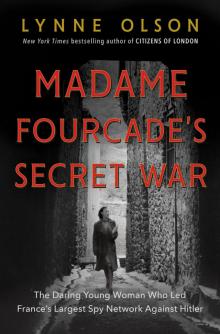 Madame Fourcade's Secret War
Madame Fourcade's Secret War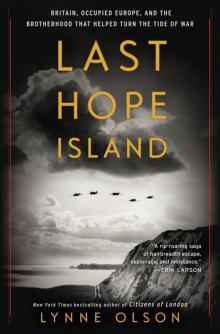 Last Hope Island
Last Hope Island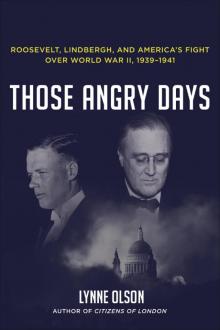 Those Angry Days
Those Angry Days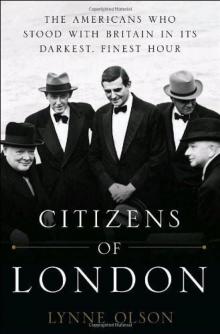 Citizens of London
Citizens of London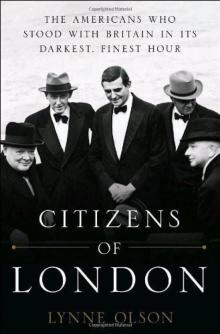 Citizens of London: The Americans Who Stood With Britain in Its Darkest, Finest Hour
Citizens of London: The Americans Who Stood With Britain in Its Darkest, Finest Hour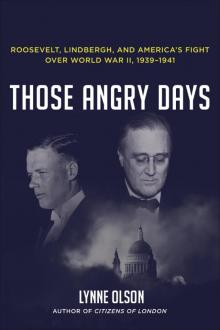 Those Angry Days: Roosevelt, Lindbergh, and America's Fight Over World War II, 1939-1941
Those Angry Days: Roosevelt, Lindbergh, and America's Fight Over World War II, 1939-1941